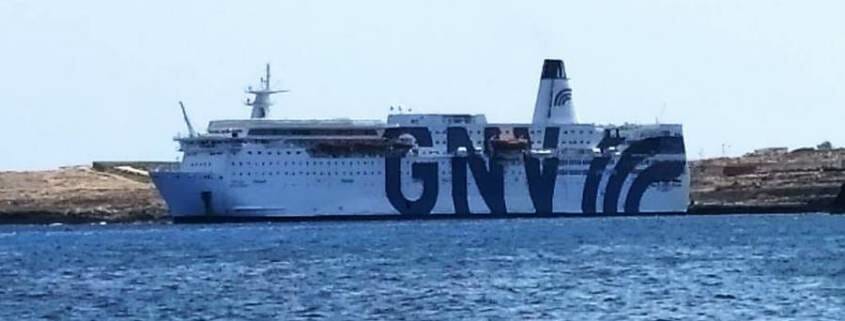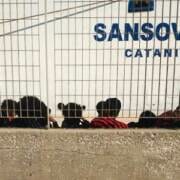Quarantine ships, a model designed for repatriation. The testimony of a legal operator
Article first published on November 25, 2021
Micromega.net – Quarantine ships for migrants are used to repatriate Tunisian citizens and to issue orders to leave the country to those from the Maghreb
“Quarantine ships are designed for the quick repatriation of Tunisians and for orders to leave the country for those people coming from North Africa. There is no other explanation and I know this because I was on these ships for a month and I continue to follow the matter through the information, which I receive from people on board. With the ships they have time to put Tunisians, Egyptians, Algerians and Moroccans on file, to repatriate them directly upon disembarking or after a short period in the detention and repatriation center (CPR*)”.
Daniela (not her real name) is a legal operator and before boarding the quarantine ships she worked in reception centers and associations dealing with the legal protection of migrants for a long period.
“The head of the mission once asked me why I wasted so much time with the Tunisians, who would be repatriated soon, and said that I should focus on the sub-Saharan people”, Daniela says when we meet to record this interview. She contacted us after the first part of the investigation about Quarantine Ships, together with other people who were on board: some to confirm what emerged from the interview and others to add pieces to a complex puzzle, born of the pandemic emergency and which still has many aspects to clarify.
“Aboard the ships the minimum conditions for preventing Covid infection are not respected, the cabins with 4 places on the ferries should be for one or two people but instead there are often 3 or 4 people. They’re full – says the legal operator – and it’s the same thing when there are meals: everyone in a tightly packed queue, in perfect conditions for contagion.”
So why do you think Italy spends about 2 million a month for each ship used to quarantine migrants?
“Because they have plenty of time to identify the men from the Maghreb and to organise their repatriation with charter flights or the issue of orders to leave the country. Italy has an agreement for quick repatriation to Tunisia, while Algeria, Egypt and Morocco are considered safe countries on a par with Senegal and Ghana, so orders to leave the country are given to people of these nationalities. The problem is that if you are persecuted because you are homosexual or part of a minority, it is difficult to make it come to light during this short period.
The point Daniela touches on is central to the reception and asylum application model which, in the name of the emergency, in recent years has changed a lot in practice, moving from requests to validate at an individual level (as required by international conventions) to a rapid response based on the country of origin. This new ’emergency’ approach does not take into account individual or minority cases of persecution.
80 % of the people deported in 2020 were Tunisians and everything happens in a matter of hours, just the time needed to organise flights.
“The job of the legal operator was not even foreseen at the start. It was added following complaints from ASGI*, the Association for Juridicial Studies on Immigration, but it changed a lot over time and was stripped of its duties” says Daniela. At the beginning, she could indicate, based on codes assigned to people, the names of those intending to apply for political asylum. “It was not binding but it was the first list gathered on board, but the prefectures were probably full of requests and therefore changed the method to disincentivise applying for protection. Now the police collects the requests at the port, with cultural mediators who often are on the side of Italian institutions and say “sign here”, without explaining that this is the form to renounce the request for asylum.”
The experience on board is recent, and Daniela is a river ready to overflow, which is why she often changes topics and loops back to things she had kept inside and that she now wants to share: “see, there isn’t much possibility to report what happens on board, the media have not dealt with this issue and are not easy to reach. If however, in the government people think this system of quarantine is useful, they should know that when there are many disembarkations, the ferry company GNV does not sterilise cabins and decks properly. So we end up with Covid-negative people becoming positive for no apparent reason, just because between one group where there were cases disembarking and another group embarking things had not been properly sterilised.”
Daniela also tells us about the prostitution trafficking, of Ivorian women who over the years have replaced those from Nigeria, but whose exploitation has remained the same: “they are already prostituted on board, in the evenings outside their cabin there is a queue of men waiting to have sexual intercourse”. The Ivorian women always travel with the men who are part of the organisations who enslave them and hold them to ransom by threatening their families who are still in the Ivory Coast, so their slavery to prostitution begins before they reach land.
In one of the first interviews in this investigation, psychologist Fabrizio had told us about the difficulty of helping women victim to trafficking because there was no separate space, divided by gender, but only cabins on the same deck. Therefore, aboard the ships, in addition to favouring the trafficking and the enslavement of women, the rules for the prevention of Covid transmission are not only not respected but on the contrary, they also encourage contagion.
While on board, Daniela did research work by cross-referencing the dates of the landings with the dates of embarkations on the quarantine ships. She found out that Tunisians spend a long time ashore, essentially a period of quarantine in the hotspots, before being allowed to board the ship. Those arriving from countries considered unsafe are put on ships almost immediately. “Those who come from Tunisia do two periods of quarantine and then they are repatriated” Daniela explains.
The Viminale, the Ministry of the Interior, has been saying for some time that it is working on a decree to regulate the migration flows of seasonal workers from Tunisia and Libya, countries that are unstable for different reasons and that do not currently offer work.
Libya comes from 10 years of civil war and is seeking stability with the elections due in a few weeks’ time. Tunisia is politically very unstable and Covid has stopped tourism and the informal economy, two important sectors for the country, leading the middle class and the poorest to try the sea route to Europe, passing through Italy but with the main aim of reaching France.
What they find, however, is a model designed to repatriate them immediately.
Valerio Nicolosi
*CPR: Centro di permanenza per il rimpatrio – Detention and repatriation center
*ASGI: Associazione per gli studi giuridici sull’immigrazione – Association for Juridical Studies on Immigration
Translated from Italian by Orsina Dessi





